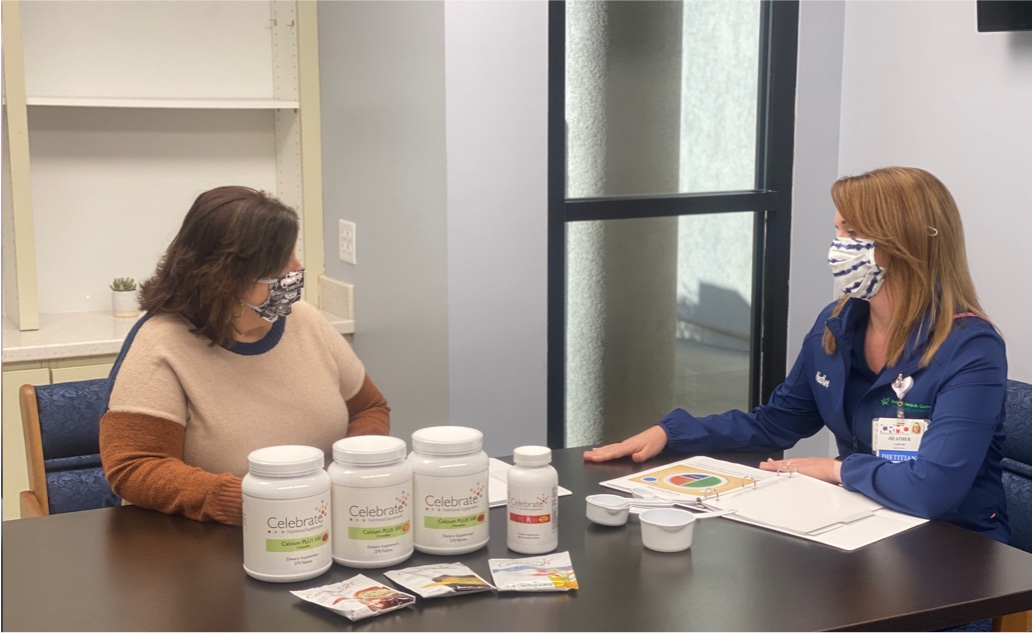What is Nutrition Counseling?
Nutrition counseling is a resource we provide to each bariatric patient to ensure they are well equipped to make the right food choices pre and post-surgery. Successful weight loss requires self discipline and education to choose the right foods to meet your caloric and protein needs daily. Through one-on-one meetings with our registered dietitian, Bonnie Whitfield, you’ll learn the fundamentals of food and how to set achievable goals so you’ll be equipped to make lifestyle changes to improve your overall health. Our nutrition counseling courses are included in all bariatric pathways, available by appointment for those interested in lifestyle nutrition education, as well.

Nutrition Counseling
Bariatric surgery is not for everyone, so we have developed a non-surgical pathway with nutrition counseling to provide all patients with the tools for successful weight-loss. This program will include nutrition education sessions with our registered dietitian to enact lifestyle changes that lead to weight loss. The results of this pathway solely rely on consistency and dedication to the changes in diet and lifestyle and does not guarantee the weight will stay off if the habits are broken. For more information on guidance and support through healthy nutrition, please contact the Bariatric and Metabolic Center.
Benefits of Nutrition Counseling
Nutrition counseling has many benefits to the physical and mental health of patients. Equipping our patients with the knowledge of how food fuels the body and what supports the body’s efficiency gives patients confidence as they start their weight-loss journey. Often, the root of an unhealthy nutrition lifestyle is a lack of knowledge of what the body requires to complete the jobs it is designed to do.
FAQs
“Food addiction” as a cause of obesity is extremely rare.
Although some people with obesity have eating disorders, such as binge eating disorder syndrome, most people have obesity caused by many factors. When treating addiction, such as alcohol and drugs, one of the first steps is to stop using drugs or alcohol. This does not work with obesity as we need to eat to live. Also, there may be other issues causing a person’s weight gain. Weight gain generally occurs when the amount of food eaten is greater than the number of calories burned. There are other conditions, however, that affect weight gain that do not involve too much eating or a less active lifestyle including:
- Poor sleeping habits
- Eating foods that may increase body fat (sugar, high fructose corn syrup, trans fat, processed meats and processed grains)
- Low intake of fat-fighting foods (fruits, vegetables, legumes, nuts, seeds, quality protein)
- Stress and mental distress
- Many types of medications
- Pollutants
Obesity also leads to more obesity, which is one of the reasons why the disease is considered progressive. Weight gain causes a number of signals (hormones) in the body that increase the risk for even greater weight gain and obesity. To make matters worse, obesity affects certain body functions that control appetite and hunger in a manner that can cause an increase in the amount of food eaten at any given meal and the desire to eat more often. There are many causes for obesity and the disease of obesity is far more than just an ‘addiction’ toward food. The treatment of obesity only as an addiction may help for a very small percentage of individuals whose only underlying cause for obesity is excessive and addictive eating, but would be unlikely to benefit most people, particularly those individuals affected by severe obesity.
Yes. Many insurance companies require patients to be on a weight loss program before qualifying for surgery. Many bariatric surgeons put their patients on a special pre-operative diet, usually two or three weeks just before surgery. The reason for the pre-operative diet is to shrink the liver and reduce fat in the abdomen. This helps during the procedure and makes it safer. Some insurance companies require a physician-monitored diet three to six months prior to surgery as part of their coverage requirement. These diets are very different from the short-term diets and usually are more about food education and showing a willingness to complete appointments and to learn.
No. Most people think of a “diet” as a plan that leaves you hungry. That is not the way people feel after surgery. Eventually, most patients get some form of appetite back 6-18 months after surgery. Your appetite is much weaker, and easier to satisfy than before. This does not mean you can eat whatever and whenever you want. Healthier food choices are important for best results, but most patients still enjoy tasty food and even occasional “treats”.
You will need to take a multivitamin for life.
You may need higher doses of certain vitamins or minerals, especially Iron, Calcium and Vitamin D. You will also need to have at least yearly lab checks. Insurance almost never pays for vitamin and mineral supplements but usually does pay for labs. You can pay for supplements out of a flex medical account.
Take the First Step
The hardest part of most journeys is taking the first step. Your weight-loss journey won’t be without challenge, but it can be without regret. Find resources here to help you get started.
Am I a Candidate?
Weight-loss surgery is not for everyone. Health evaluations will help determine if you are a candidate.
Getting Started
Learn how to get started on your weight-loss journey and if surgical treatment is right for you.
Attend a Seminar
Deciding to have weight-loss surgery can be life changing. Attend a free, informational seminar to learn more.